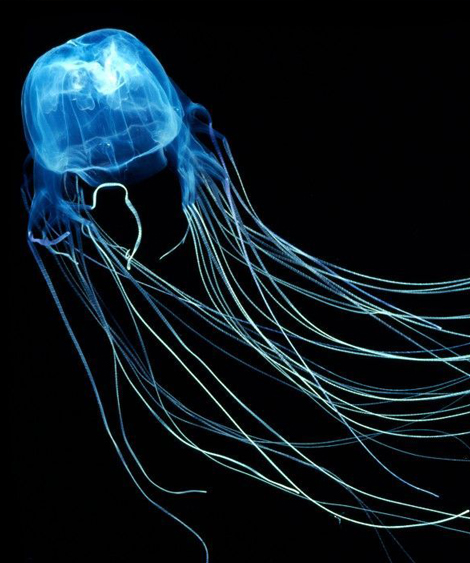About Box Jelly Fish


The box jellyfish, known for its almost transparent appearance and potent venom, is considered one of the most dangerous jellyfish in the world. Its sting can cause extreme pain, and in severe cases, fatalities. However, recent scientific studies have begun to explore the potential of box jellyfish venom in the field of medicine, revealing its promising applications beyond its perilous reputation.
One of the most significant areas of research involves the venom's ability to create pores in cell membranes, a property that could be used to deliver drugs directly into cells, enhancing their efficacy and reducing side effects. Additionally, components of the venom are being studied for their potential to kill cancer cells by targeting the same pathways that lead to cell death in envenomation.
The box jellyfish, known for its almost transparent appearance and potent venom, is considered one of the most dangerous jellyfish in the world. Its sting can cause extreme pain, and in severe cases, fatalities. However, recent scientific studies have begun to explore the potential of box jellyfish venom in the field of medicine, revealing its promising applications beyond its perilous reputation.
As with any wildlife-derived product, ethical concerns about the conservation of box jellyfish populations and their habitats are paramount. Advances in biotechnology, such as recombinant DNA technology, offer a pathway to producing venom components in the laboratory, minimizing the impact on natural populations and ensuring a sustainable source of these potentially life-saving compounds.
The venom of the box jellyfish, while feared for its deadly effects, holds untapped potential in the realm of medical science. As research into its components continues, the possibility of developing new treatments for cancer, cardiovascular diseases, and targeted drug delivery systems becomes increasingly tangible. This shift from venom as a lethal threat to a source of healing underscores the importance of biodiversity and the hidden medical treasures awaiting discovery in the natural world.


As with any wildlife-derived product, ethical concerns about the conservation of box jellyfish populations and their habitats are paramount. Advances in biotechnology, such as recombinant DNA technology, offer a pathway to producing venom components in the laboratory, minimizing the impact on natural populations and ensuring a sustainable source of these potentially life-saving compounds.
The venom of the box jellyfish, while feared for its deadly effects, holds untapped potential in the realm of medical science. As research into its components continues, the possibility of developing new treatments for cancer, cardiovascular diseases, and targeted drug delivery systems becomes increasingly tangible. This shift from venom as a lethal threat to a source of healing underscores the importance of biodiversity and the hidden medical treasures awaiting discovery in the natural world.
Total Species Of Jelly Fish Are
Our Family In Asia
People Who Trust Us
# Awesome terrarium
Location: Rieterstrasse 6, 8002 Zürich, Switzerland
Phone: +41 SWISS CURE
Email: info@swisscurepharma.com
Office Timming
- Monday9:00am-6:00pm
- Tuesday9:00am-6:00pm
- Wednesday9:00am-6:00pm
- Thursday9:00am-6:00pm
- Friday9:00am-6:00pm
- Saturday10:00am-0:00pm
- SundayClosed


















